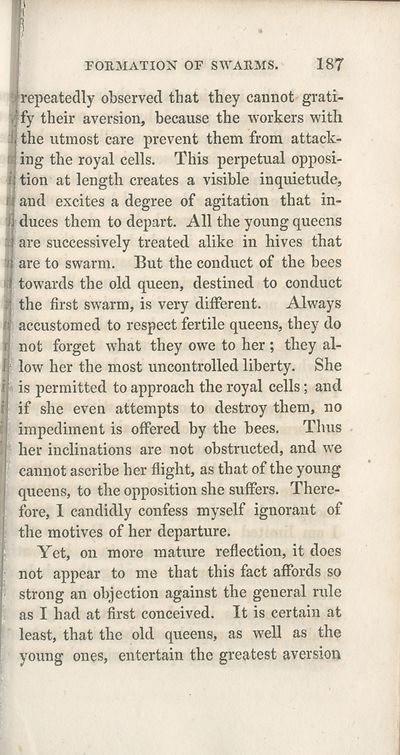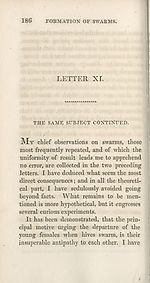Download files
Complete book:
Individual page:
Thumbnail gallery: Grid view | List view

FORMATION OF SWARMS. 187
repeatedly observed that they cannot grati¬
fy their aversion, because the workers with
Jj the utmost care prevent them from attack-
Sj ing the royal cells. This perpetual opposi¬
te tion at length creates a visible inquietude,
^ and excites a degree of agitation that in-
! duces them to depart. All the young queens
j are successively treated alike in hives that
| are to swarm. But the conduct of the bees
I towards the old queen, destined to conduct
the first swarm, is very different. Always
accustomed to respect fertile queens, they do
t not forget what they owe to her; they al-
; low her the most uncontrolled liberty. She
if is permitted to approach the royal cells; and
if she even attempts to destroy them, no
impediment is offered by the bees. Thus
her inclinations are not obstructed, and we
cannot ascribe her flight, as that of the young
queens, to the opposition she suffers. There¬
fore, 1 candidly confess myself ignorant of
the motives of her departure.
Yet, on more mature reflection, it does
not appear to me that this fact affords so
strong an objection against the general rule
as I had at first conceived. It is certain at
least, that the old queens, as well as the
young ones, entertain the greatest aversion
repeatedly observed that they cannot grati¬
fy their aversion, because the workers with
Jj the utmost care prevent them from attack-
Sj ing the royal cells. This perpetual opposi¬
te tion at length creates a visible inquietude,
^ and excites a degree of agitation that in-
! duces them to depart. All the young queens
j are successively treated alike in hives that
| are to swarm. But the conduct of the bees
I towards the old queen, destined to conduct
the first swarm, is very different. Always
accustomed to respect fertile queens, they do
t not forget what they owe to her; they al-
; low her the most uncontrolled liberty. She
if is permitted to approach the royal cells; and
if she even attempts to destroy them, no
impediment is offered by the bees. Thus
her inclinations are not obstructed, and we
cannot ascribe her flight, as that of the young
queens, to the opposition she suffers. There¬
fore, 1 candidly confess myself ignorant of
the motives of her departure.
Yet, on more mature reflection, it does
not appear to me that this fact affords so
strong an objection against the general rule
as I had at first conceived. It is certain at
least, that the old queens, as well as the
young ones, entertain the greatest aversion
Set display mode to:
![]() Universal Viewer |
Universal Viewer | ![]() Mirador |
Large image | Transcription
Mirador |
Large image | Transcription
| Antiquarian books of Scotland > Curiosities & wonders > New observations on the natural history of bees > (205) |
|---|
| Permanent URL | https://digital.nls.uk/128808327 |
|---|
| Description | Thousands of printed books from the Antiquarian Books of Scotland collection which dates from 1641 to the 1980s. The collection consists of 14,800 books which were published in Scotland or have a Scottish connection, e.g. through the author, printer or owner. Subjects covered include sport, education, diseases, adventure, occupations, Jacobites, politics and religion. Among the 29 languages represented are English, Gaelic, Italian, French, Russian and Swedish. |
|---|

